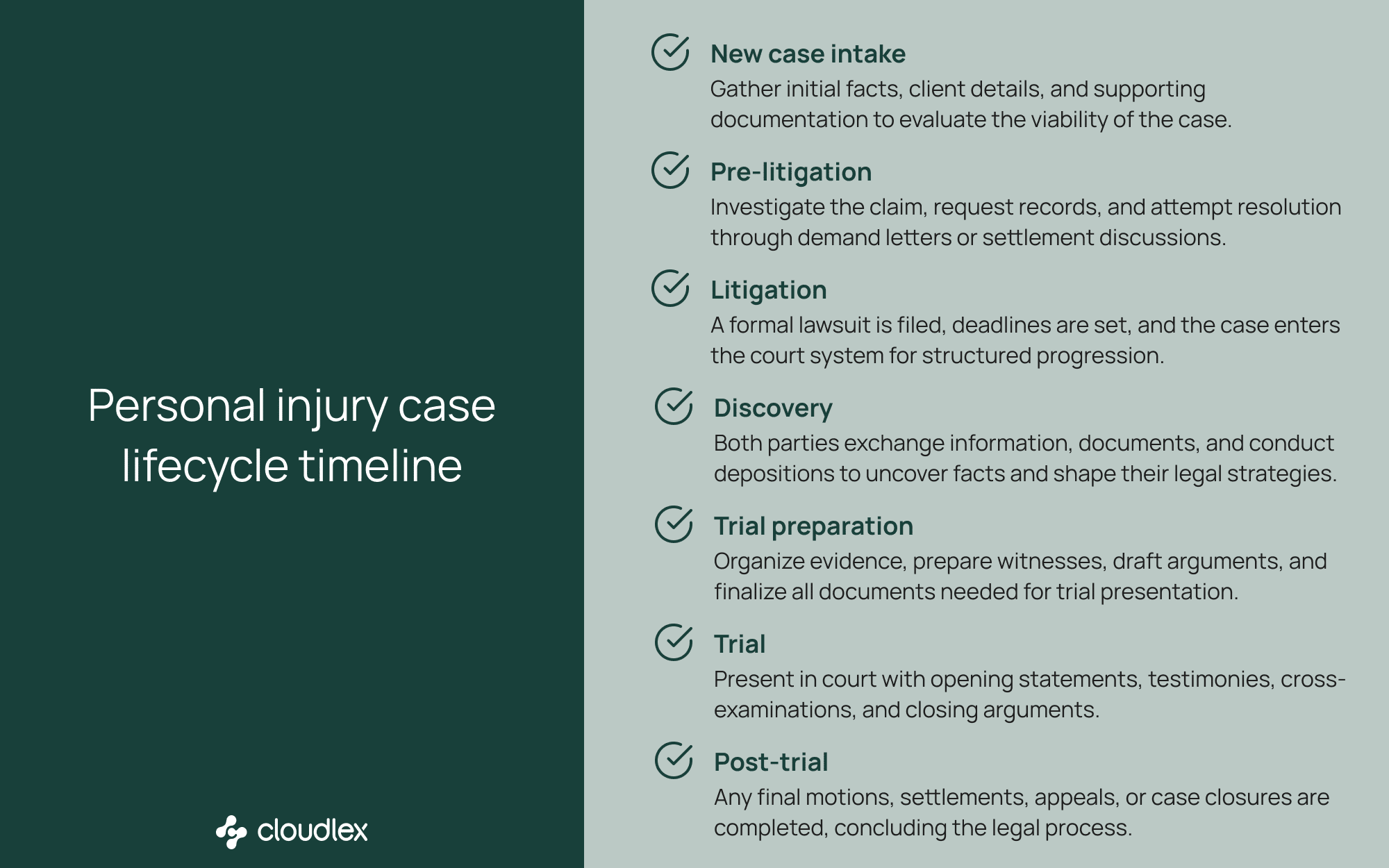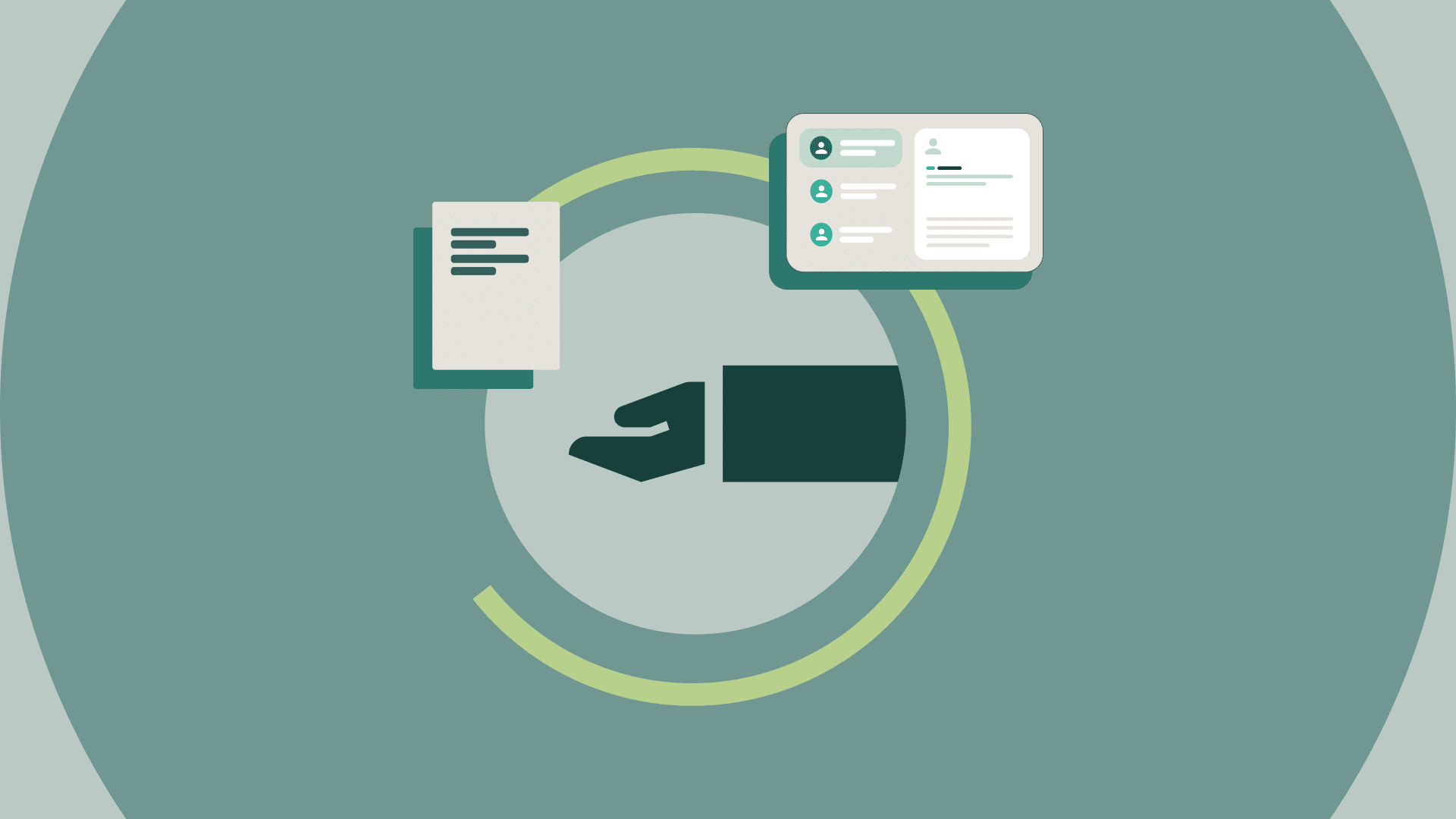Preparing for trial is one of the most complex parts of a personal injury case. As the trial date approaches, pressure builds and tasks pile up.
In reality, successful trial preparation begins long before anyone sets foot in a courtroom. For legal teams, building a strong case means more than collecting documents or lining up witnesses. It requires dissecting every medical record, organizing timelines of injury and treatment, and developing a narrative that connects your client’s pain to the defendant’s negligence.
We’ll walk through the stages of trial preparation, offering a clear, structured approach to help you and your team prepare confidently and effectively for a personal injury trial – whether it’s a car accident, slip and fall, or workplace injury.
Contents
What is trial preparation?
Trial preparation refers to everything a legal team does to get ready for a courtroom trial – from the first round of witness interviews to the final closing arguments.
It’s a comprehensive process that includes:
- Gathering and organizing evidence
- Preparing witnesses for testimony
- Drafting key filings and trial documents
- Building persuasive opening statements
- Preparing responses to the opposing party’s arguments
- Managing the logistics of trial day
In a personal injury case, trial prep typically begins during the litigation phase, after pre-litigation negotiations end and a trial date is set. The more organized and thorough your preparation, the stronger your case will be in front of a judge or jury.
Personal injury case lifecycle: where trial prep fits in
Understanding when and how trial preparation fits into a typical personal injury case can help you structure your work. Here’s a simplified flow:
- New Case Intake – Gathering initial details, facts, and medical records
- Pre-Litigation – Settlement negotiations and claim evaluations
- Litigation – Begins Filing the lawsuit and preparing for discovery
- Discovery – Exchanging legal documents, interrogatories, and depositions
- Trial Preparation – Creating the case narrative, prepping witnesses, managing filings
- Trial – Presenting your case in court
- Post-Trial – Settling, appealing, or closing the case
Trial prep often overlaps with discovery and continues through the days leading up to the actual trial.

Trial prep checklist for injury attorneys
1. Evidence management
You’ll need to carefully gather and organize medical records, accident reports, and expert analyses, while also preparing to rebut the defense’s evidence.
Common evidence includes:
- Depositions and witness statements
- Police and accident reports
- Medical records and bills
- Photos, videos, and visual aids
- Emails, texts, or other correspondence
- Requests for admission and interrogatory responses
Keeping all this information organized, often across multiple formats and contributors, is one of the biggest challenges. A centralized and searchable system for managing your case file can prevent delays and ensure no detail is missed.
2. Witness and expert preparation
Witnesses play a key role in shaping how the jury understands your case.
Your prep should include:
- Confirming availability and issuing subpoenas
- Reviewing prior witness statements
- Practicing direct examination questions
- Anticipating cross examination by the opposing party
- Coaching on courtroom demeanor and clarity
- Preparing expert witnesses to explain technical issues in a way laypeople can follow
In PI cases, this often includes treating physicians, accident reconstructionists, or life care planners, each of whom must clearly explain how the injury occurred and why damages are warranted.
The better you prepare your witnesses, the more credible and effective their testimony will be in court.
3. Trial strategy and narrative building
Trials aren’t just about presenting facts – they’re about telling a story that resonates with the jury. In personal injury cases, that story must clearly connect the defendant’s actions to the client’s suffering.
To build yours:
- Start early on your opening statement – this sets the tone and direction
- Develop a theme that frames your client’s experience
- Use a timeline to sequence events clearly and persuasively
- Identify weaknesses in the opposing party’s story and prepare counters
- Tie each witness testimony back to your core argument
- Visual aids, such as timelines, charts, or diagrams, are powerful tools for illustrating complex ideas or sequences of events.
4. Filing, deadlines, and logistics
Trial preparation includes a long list of administrative tasks and procedural requirements that must be completed before you walk into court.
These include:
- Filing pre-trial motions
- Submitting proposed jury instructions
- Preparing exhibits and exhibit lists
- Creating outlines for cross examination and direct examination
- Scheduling and confirming all participants
- Testing any tech you’ll use in court (AV, presentation software, etc.)
Using digital tools that track tasks, deadlines, and assignments across your legal team can help ensure nothing falls through the cracks, especially in the final weeks of trial prep.
5. Client communication and readiness
Injury clients are often nervous and unfamiliar with court proceedings. Keeping them informed, prepared, and emotionally grounded is essential.
- Explain the trial process and what to expect
- Review any materials they may need to understand (e.g., medical records, timelines)
- Prepare them for the possibility of cross examination
- Walk through courtroom etiquette and expectations
- Discuss potential outcomes, including award ranges, to set expectations
Clients who understand your plan, and their role in it, are more likely to feel confident and cooperative throughout the court case.
Trial prep challenges and tips
Common challenges:
- Last-minute document confusion
- Poor communication among team members
- Disorganized witness testimony
- Inconsistent prep across remote teams
- Overwhelming volume of evidence
Tips to overcome them:
- Create a trial prep checklist with deadlines for every major task
- Assign specific roles across your legal team and track accountability
- Use secure cloud platforms to centralize your documents and collaborate in real-time
- Practice mock trial sessions to refine your arguments and timing
- Review the rules of evidence to anticipate objections and limitations
A structured workflow supported by the right digital tools makes this process smoother. Platforms like CloudLex help PI attorneys stay ahead by centralizing depositions, treatment records, and trial exhibits in one intuitive system.
Trial prep timeline: what to do and when
60–90 days before trial
- Finish all outstanding discovery
- Confirm witness availability
- Draft opening statement
- Identify and prep expert witnesses
- Create exhibit and evidence lists
30 days before trial
- Write and file pre-trial motions
- Prepare jury instructions
- Outline direct and cross examination questions
- Finalize courtroom tech needs and exhibit presentation
1 week before trial
- Rehearse with witnesses
- Hold final internal team prep session
- Confirm logistics with the client, judge’s office, and court clerk
- Finalize your closing argument
Trial execution and client advocacy in the courtroom
Here’s where all the planning, research, and prep come together:
- Attorneys deliver the opening statement to lay out the theory of the case
- They conduct direct and cross examination of witnesses, referencing notes and documents live in court
- The judge rules on objections, admissibility, and courtroom procedure
- The jury observes witness demeanor, listens to expert testimony, and evaluates the facts
- Attorneys deliver closing arguments designed to reinforce the evidence and push for a favorable decision
Throughout this stage, your legal team needs to be agile. CloudLex supports you in real-time with tools to instantly locate documents, treatment records, or deposition highlight, so you’re never caught off guard.
Meanwhile, the client needs confidence that their legal team is fully focused, well-organized, and responsive. Tools that automate and centralize trial preparation allow attorneys to focus on the argument, not the admin.
Prepare early, win confidently
Trial preparation is about staying organized, but it’s also about creating clarity, telling a compelling story, and being ready for whatever happens in the courtroom.
By starting early, maintaining strong communication, and using tools that help your team stay aligned, your personal injury firm can approach trial with confidence, not chaos.
With a clear workflow, from discovery to trial day, your team can spend less time tracking documents and more time building a winning argument.
To learn more about how CloudLex can support your workflow, contact us today!

